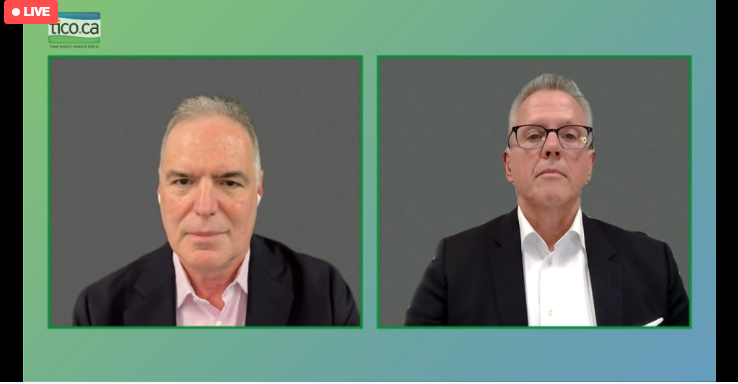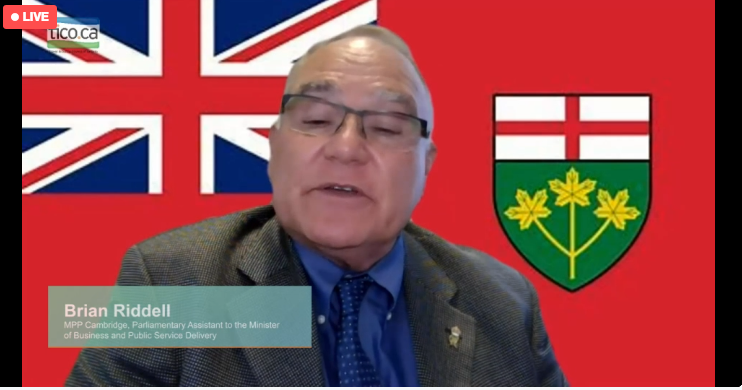TORONTO — Proposals for a potentially new way forward for the Ontario travel industry’s Compensation Fund will be distributed next week, and if last night’s TICO AGM is any indication, TICO registrants are ready.
With participation topping 150, the virtual AGM included a lively Q&A session that showed just how engaged registrants are in the year-long review of TICO’s funding framework and fee model, including the Comp Fund. Many have advocated for a consumer-pay model, while other options include a risk-based model, or no Fund at all.
The funding review is now complete, and a detailed business case has been shared with the Ontario government. A package outlining the proposals will be delivered to travel industry stakeholders next week. Also next week, TICO will launch a series of consultations on the proposals, with the goal of gathering input.
NO VOTE ON PROPOSED FUND CHANGES
One AGM participant asked if TICO registrants will have an opportunity to vote on the proposed changes.
The short answer is no, said TICO President and CEO, Richard Smart. “There will not be an opportunity to vote. The process we’re following, one that’s defined in the administrative agreement, is to consult with all stakeholders – travel advisors and tour operators – and then share the proposals, which we intend to do next week, receive input, and then a summary of those inputs are taken back to the TICO board and the Ministry [of Public and Business Service Delivery of Ontario].”
Another participant questioned TICO’s use of monies from the Comp Fund for TICO operating expenses.
“The transfers you’re referring to have been taking place since 1997 when TICO was formed,” Smart said in response. “One of our goals in this funding and fee review is to once and for all fix that fundamental misalignment of fees. It’s our goal to address those transfers. When we hold the consultations in October and November we’ll have more to say on that.”
CATO chair Brett Walker asked why TICO doesn’t disclose Comp Fund claim caps to consumers, noting that the caps – for example, $5,000 per person, per claim – haven’t been adjusted since the inception of the Fund.
“The Fund has its complexities,” said Smart. “In this day and age, consumers are bombarded with different rules and regulations, and reading the fine print isn’t always top of mind. Our site contains all the information on caps and thresholds and the like … it’s all there. To explain that to consumers either on an invoice that’s already very detailed, or to put it in the fine print, consumers aren’t willing to go to those depths to find out all those details.”
Smart added: “The caps are something we looked at [during the review] and we’ll have more to say during the consultations. The fund does have its limitations. The short answer is, I acknowledge those challenges. We ask ourselves about that every day.”
Both CATO and ACTA have been critical of the funding framework and fee model review, charging that the organizations have been excluded from the process despite a decade of advocating for change to the Fund. In July 2023 both ACTA and CATO withdrew their appointees from the TICO board. Weeks later, TICO announced it was decreasing the number of TICO board members from 11 to 9, in line with orders from the Minister of Public and Business Service Delivery of Ontario.
The move was expected, however ACTA and CATO have pressed on with their calls for transparency. TICO has long maintained that any potential changes to the funding model must be reviewed by the Ontario government first, before they’re made public to anyone – and that includes ACTA and CATO.

TICO chairman Michael Levinson and TICO President and CEO Richard Smart
BOARD MEMBER VOTING GLITCH
Due to a technical glitch last night in the AGM’s voting process for the TICO board’s two new Industry Directors, the vote was postponed. An impressive list of 9 industry candidates are on the ballot: Julie Boucher, Judith Coates, Andrew Dawson, Patrick Doyle, Mike Foster, David Harris, Dan Langevin, Anthony Saunders and Robert Townshend.
The new makeup of the TICO board is in line with one of five orders from the Ministry. The board will have three Industry Directors involved with the industry, and three Public Directors with no stake in travel. The election process will (eventually, once the tech glitch gets fixed) bring in two new Industry Directors, joining a third Industry Director already on the board, whose term continues until 2024. The new board composition will be 3/3/3 – Industry, Public, Minister’s appointees. The three new Public Directors, announced last night, are Archana Gupta-Harit (one-year term), Heather Colquhoun (two-year term) and Christopher Warren (three-year term).
According to the four other orders from Minister Rasheed, TICO must “ensure all Board members possess a positive orientation for proactive consumer protection initiatives.” TICO must also “ensure no more than 34% of the members of the board are drawn from the travel agent and travel wholesaler industry.” TICO also must establish a nominations committee with requirements around eligibility criteria for nominated Board members.
Finally, TICO must establish an industry advisory council, “comprised of members representing the interests of travel agents and travel wholesalers to report to and advise the board.”
The industry advisory board, comprised of retailers and wholesalers, will be formed in January 2024.
Brian Riddell, MPP Cambridge and Parliamentary Assistant to Kaleed Rasheed, Minister of Business and Public Service Delivery, said he appreciated the steps TICO has taken to implement the Ministry’s five orders, adding the orders will help deliver “the most efficient and effective governance.” Riddell also said the new board composition will ensure TICO has “more of a balanced skills-based board.”
Riddell noted that the past few years “have been a challenge for Ontario travel and tourism, and travel agents. But we know more and more Ontarians are travelling. Consumer confidence will be key to the recovery.”
COMP FUND AT $22,786,930
Currently the Comp Fund sits at $22,786,930. There were $616,542 in claims against the Fund claims over the past year, up from $491K last year. It was the highest level of claims in a decade, said Smart, with 278 consumers assisted.
A case of end-supplier failure – for Crystal Cruises, before it was brought back to life by its new owners – dominated the claims, and that had one AGM participant asking about end-supplier failure, long a frustration of TICO registrants who pay into the Fund. “The Crystal Cruises failure had a disproportionate portion of claims, but historically that hasn’t been the case,” said Smart. “End supplier failure has been in and out of the legislation over the past 27 years. We’ll have more to say about that in the upcoming consultations. Rest assured, what we saw this past fiscal year was more of an anomaly than a trend.”
REGISTRANTS ASK ABOUT “EXORBITANT EXPENSE” & STAFF SALARIES
Smart also noted that TICO operated in a near-zero revenue environment for the third year in a row. TICO’s operating expenses came in at $4.35 million, under budget and lower than prior year, he said: “Over the past five fiscal years TICO’s operating expenses have remained flat.” There’s also an “unsustainable deficit.”
One AGM participant took issue: “ACTA and Ontario travel businesses have been calling for a regulator that is right-size for this industry. How can TICO justify the exorbitant expense that has been thrust upon registrants?”
In response, Smart said: “I simply don’t accept that TICO’s fees have been exorbitant. Our board is very tough and they make sure that any cost increases are understandable and reasonable. I would also point out that during the pandemic we didn’t levy any fees. We take burden reduction very seriously. The numbers speak for themselves.”
He added: “I’m the first to acknowledge that retailers and tour operators have been to hell and back with the pandemic. But consumer complaints have also risen. There’s a fine balance between protecting consumers and being fair to industry. We want to find fair solutions so that consumers remain confident purchasing their travel from Ontario’s registered businesses.”
Travel’s recovery has numbers quickly approaching pre-pandemic levels, however “continued economic headwinds are cause for concern for the industry,” said Smart.
Another AGM participant took issue with the increase in TICO’s salary payout. Said Smart: “Over a 10-year period we have added some additional staff in selected areas core to our consumer protection mandate. We’re not a travel agency, we’re not a tour operator, we’re a regulator. So we benchmark ourselves with other regulators. And our salaries are very consistent with those benchmarks.”
In a follow up question, a participant asked if Ontario registrants can expect the same kind of salary growth. “During the pandemic, all of TICO staff took pay reductions, and we had to furlough and lay off staff,” said Smart. “Since then we have kept any increases at the rate of inflation and tied to what benchmarks indicate is fair.”
TICO AWARENESS WITH CONSUMERS
Based on TICO’s surveys, consumer awareness of TICO is at 41%. And seven in 10 consumers say they see the value that TICO provides as a regulator of travel services.
Former TICO board chair Jean Hebért, who is now Executive Director of CATO, asked about the decrease in consumer awareness of TICO, and if $100,000 in the budget is enough to bolster that awareness. Hebért asked if a small fee added to invoices could improve consumer protection.
“It’s true that our consumer awareness budget is lower than previous years, but we’ve also been very creative in how we promote consumer awareness,” said Smart, pointing to programs like Google ad grants, and initiatives like more in-house innovation. “We’re using influencers to amplify our consumer protection message. So the investment may be lower … but generally our consumer awareness numbers are good compared to other regulators.”
As for the possibility of a small fee added to invoices, “that’s one of the options that was considered in funding and fee review,” said Smart. “We’ll have more to say about that during consultations.”
6% DECLINE IN REGISTRANTS; CONSOLIDATION CONTINUES
TICO has seen an almost 6% decline in registrants, with 328 voluntary terminations. “We continue to experience consolidation in the sector,” said Smart. “It’s always disheartening when we see a business close its doors. On the other hand, 140 new applications were processed. That’s double from the prior year.”
One question tackled the decrease in TICO registrants, asking how TICO and the Ontario government plan to reverse the downward trend of Ontario businesses.
“With the consumer messaging that we provide to consumers across the province, TICO always recommends and encourages consumers to always deal with TICO registered retailers. Yes, there’s been a decline in the number of registrants, but the market as a whole – up until pandemic – was growing. Consolidation and new business models have caused the industry to grow as a whole. We’ve seen a real resurgence of sales this year. We’re cautiously optimistic that we’ll see a return to those record pre-pandemic levels. We believe the province is open for business and we’re doing our part, small as that might be, to support that. We’re all on the same page here, wanting to see Ontario businesses thrive.”
Interest in becoming TICO-certified is accelerating, he added. This fiscal year, some 7,100 individuals wrote TICO exams. That’s up 50% from the previous year. “It’s a clear sign of pipeline and new individuals choosing travel as a career,” said Smart.

Brian Riddell, MPP Cambridge and Parliamentary Assistant to the Minister of Business and Public Service Delivery

